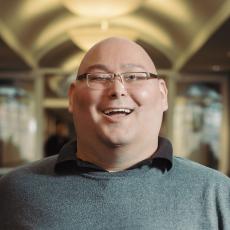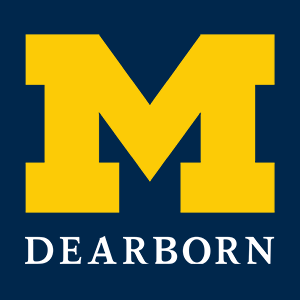Harry Rahn has been a long-standing member of the UM-Dearborn community. Nearly six years ago, he joined the university as a young undergraduate student. Today, he is completing a master’s degree in environmental science and is preparing for a career in higher education. However, his journey here is defined by much more than his academic studies. He serves large roles in offices, leads initiatives on campus, and has become a guiding hand for his peers.
“For nearly six years, I've been dedicated to supporting students in higher education through my role at the University of Michigan-Dearborn's Office of Academic Success. This experience has allowed me to explore understanding our students' aspirations and future career goals, bringing me immense joy.” - Harry Rahn
In continuing his academic journey after accomplishing his bachelor’s, Harry has made an impact on Dearborn’s campus that will last well beyond his graduation date.
Serving the community
During the formative years of his life, Harry talks about the support services that were offered to him through his public schools. Having grown up with access to those resources, he knew how vital they were, and felt led to help provide similar services to other students.
In his work with UM-Dearborn’s Disability and Accessibility Services (DAS) Office, Harry helps increase accessibility and inclusivity on our campus. He has accomplished this by working with faculty and DAS staff to provide special testing accommodations for students through the assistance of readers and scribes. He also helped create accessible videos for students to help navigate the office’s web page as well as other DAS resources.
“The legacy I hope to leave behind is one of just giving back and really pushing for student support, giving them a voice, and advocating for them on campus,” he says.
Supporting campus families
In addition to his work with DAS, Harry spent the majority of his college career working in the University of Michigan-Dearborn's Office of Academic Success. In his over six years with the office, he currently holds the position of Interim Tutoring Coordinator helping students to navigate success and resources on campus. This work sometimes includes matching students with a tutor to help them reach their academic goals.
During his experience at the Office of Academic Success, Harry took part in a summer initiative in partnership with UM-Dearborn’s Experience+ program that would provide tutoring services to the children of faculty, staff, and students at the university. This pilot program, which took place during the summer of 2021, provided additional online support to students following the COVID-19 pandemic.
“As we sought to support the academic needs of faculty members' families during this challenging time, my colleagues and I were approached by supervisors to collaborate on an article detailing our experiences,” he says. “The resulting piece shed light on the hurdles faced by students as we adapted to the nuances of online academic support.”
Harry acted as one of the tutors during this summer program along with eight other UM-Dearborn students.
Making an impact
Palm oil is a commonly used vegetable oil that has been found to have detrimental effects on our cardiovascular health as well as negative impacts on the environment. In response to growing concerns about the adverse effects of palm oil on both human health and the environment, Hary helped lead an organization at UM-Dearborn called Palm-to-Palm. He describes it as, “a young professional-led initiative dedicated to ending the exploitation of people and wildlife in tropical regions by forming coalitions — with educational and other institutions — to raise awareness and avoid the use of palm oil in foods and other consumer products.”
Since its 2020 inception, Harry and the Palm-to-Palm team have made significant strides to reduce the use of palm oil on Dearborn’s campus. They were also able to convince the University of Michigan to divest from a Palm Oil Plantation in the Democratic Republic of Congo after working with the international nonprofit news organization GRAIN to secure documentation on the alleged workplace and human rights violations conducted by the company.
“In the end, by working with facilities, Picasso Restaurant Group certified the University of Michigan-Dearborn as palm oil reduced on March 21st,” Rahn says.


